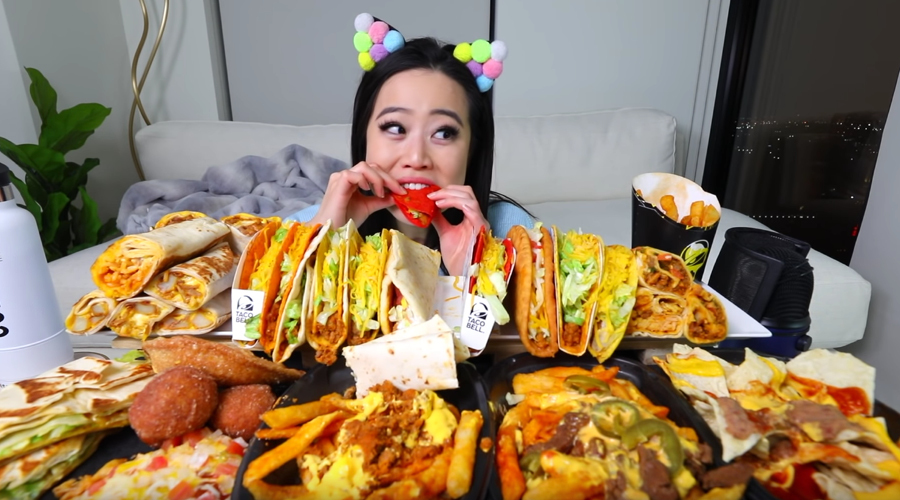Mukbang meaning has become a buzzword in the digital age, capturing the attention of food enthusiasts and online content creators alike. This unique phenomenon originated in South Korea and has since spread globally, transforming the way we perceive food and entertainment. At its core, mukbang combines eating large quantities of food while engaging with an audience through live streaming or pre-recorded videos. The term "mukbang" itself is a fusion of two Korean words: "muk" meaning eating and "bang" meaning broadcast. This delightful blend creates a captivating experience that goes beyond mere consumption of food.
As viewers tune in to watch their favorite mukbang hosts devour an array of delectable dishes, they not only witness the spectacle of eating but also connect with the hosts on a personal level. This interaction fosters a sense of community among viewers, who often share their thoughts and feelings in the comments section. The popularity of mukbang has been fueled by social media platforms, where creators showcase their culinary exploits, share recipes, and even engage in conversations with their fans.
In this article, we will delve deeper into the mukbang phenomenon, exploring its roots, cultural significance, and its impact on modern food consumption. We will answer key questions about mukbang meaning, its origins, and what makes it so appealing to millions globally. Whether you're a seasoned mukbang viewer or just curious about this trend, join us as we uncover the layers of this fascinating culinary performance.
What is the Origin of Mukbang?
Mukbang originated in South Korea during the early 2010s. It began as a way for individuals to connect through food while providing entertainment. Initially, these broadcasts were primarily available on platforms like AfreecaTV, where viewers could watch hosts consume large quantities of food while chatting with their audience. As the trend gained traction, it evolved to include creative presentations, diverse cuisines, and collaborations between popular mukbang hosts.
Why is Mukbang So Popular?
Several factors contribute to the popularity of mukbang. Firstly, it taps into the universal love of food. People enjoy watching others indulge in delicious meals, often making them crave the same dishes. Secondly, mukbang provides a sense of companionship for viewers, especially those who may feel lonely or isolated. The interactive nature of the broadcasts allows participants to feel connected to the host and other viewers, creating a virtual dining experience.
How Does Mukbang Influence Eating Habits?
The mukbang trend has had a significant impact on eating habits, sparking both positive and negative discussions. On one hand, it encourages viewers to explore new foods, cultures, and cuisines. However, it can also promote unhealthy eating habits, as some hosts consume excessive amounts of food, leading to concerns about body image and eating disorders.
What Types of Food are Featured in Mukbang?
Mukbang participants often showcase a wide variety of foods, from traditional Korean dishes like bibimbap and tteokbokki to international favorites such as pizza, burgers, and sushi. The diversity in food choices allows hosts to attract a broad audience and keeps viewers engaged with new culinary experiences.
Are There Any Famous Mukbang Hosts?
Yes, several mukbang hosts have gained immense popularity, both in South Korea and internationally. Some of the most well-known figures in the mukbang world include:
- Banzz: Known for his incredible eating speed and ability to consume large quantities of food.
- Yuka Kinoshita: A Japanese mukbang star famous for her creative food challenges.
- Stephanie Soo: An American mukbang creator who combines storytelling with her eating broadcasts.
What is the Mukbang Culture Like?
The mukbang culture is characterized by its emphasis on community and connection. Many viewers engage with hosts through comments and social media, sharing their thoughts and even suggesting meals for future broadcasts. This interaction fosters a supportive environment where viewers can celebrate their love of food together.
What Are the Potential Downsides of Mukbang?
While mukbang offers entertainment and connection, there are potential downsides. Some concerns include:
- Health Risks: Excessive consumption of food can lead to health issues such as obesity, diabetes, and heart disease.
- Body Image Issues: The portrayal of extreme eating can contribute to unhealthy body image perceptions among viewers.
- Pressure on Hosts: Mukbang hosts may feel pressured to consume more food or maintain a certain image to satisfy their audience.
What is the Future of Mukbang?
As mukbang continues to evolve, it is likely to adapt to changing viewer preferences and health consciousness. Many hosts are already incorporating healthier food options and mindful eating practices into their broadcasts. Additionally, the rise of virtual reality and augmented reality could offer new ways for viewers to engage with mukbang content, creating immersive dining experiences.
Conclusion: What Does Mukbang Mean to You?
The mukbang meaning extends beyond just eating; it encompasses connection, community, and the joy of food. As this phenomenon grows, it will be interesting to see how it continues to shape our relationship with food and each other. Whether you’re a casual viewer or a mukbang aficionado, the world of mukbang invites you to join in on the feast, share your experiences, and explore the delicious diversity of culinary delights that await.




